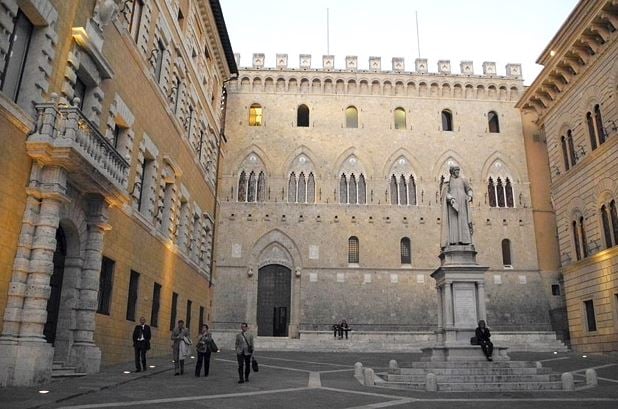Bank – definition and meaning
A bank is a financial institution that makes a profit by taking people’s deposits and lending that money at a profit. In other words, the institution charges more for its loans than it pays on deposits. In fact, banks pay no interest on some types of accounts, such as checking accounts or current accounts. Sometimes they even charge a fee to look after customers’ money.
Apart from central banks, there are two main types of banks:
– commercial (retail) banks, and
– investment (merchant) banks.
In the United Kingdom, the term ‘high street banks’ refers to large retail banks.
The word ‘bank’ comes from Middle French ‘banque,’ which came from Old Italian ‘banca,’ meaning ‘table.’ In Old High German ‘bank’ meant ‘bench, counter.’
In wealthy Renaissance Italian cities, bankers used benches as makeshift exchange counters. They used to place a green tablecloth on the benches.
According to FINANCECLAP:
“A bank is a financial institution where individuals, companies, charities, government departments, and other entities can deposit and borrow money.”

Commercial vs. investment bank
Commercial banks focus on members of the general public as customers. Investment banks, on the other hand, deal with the needs of companies.
Commercial banks take deposits and lend money while investment banks help companies obtain funds through the issue of securities.
However, commercial banks do not deal exclusively with private individuals. They may also have corporate clients.
Most large banks are commercial banks because their main business involves taking deposits and lending. However, these giant institutions also have considerable investment banking operations. Examples of large commercial banks are Barclays, HSBC, and JP Morgan Chase.
Famous investment banks, such as Morgan Stanley and Goldman Sachs, also take wholesale deposits and lend. However, the bulk of investment banks’ operations involves securities.
The global financial crisis effect
Since 2007/8 global financial crisis, the number of stand-alone investment banks has plummeted. Most have become parts of large commercial banks. In fact, a few stand-alone investment banks, such as Lehman Brothers, went bust during the crisis.
Commercial banks are more risk-averse than investment banks. In other words, commercial banks are more cautious than investment banks.
The Federal Reserve Bank of San Francisco says the following about commercial banks:
“Commercial banks play an important role in the financial system and the economy. As a key component of the financial system, banks allocate funds from savers to borrowers in an efficient manner.”
“They provide specialized financial services, which reduce the cost of obtaining information about both savings and borrowing opportunities. These financial services help to make the overall economy more efficient.”

Banks’ activities have broadened considerably over the past few hundred years. Today they include:
- – commodity trading
- – consumer finance
- – corporate banking
- – foreign exchange trading
- – futures and options trading
- – insurance
- – investment banking
- – money market trading
- – personal banking
- – private banking
- – trading in equities
Banks are closely regulated
Banks have a huge impact on a country’s financial system and the overall economy. Hence, governments, central banks, and regulators monitor these financial institutions closely.
Regulations are in place to limit banks’ exposures to liquidity risks and overall solvency risk. Above all, the authorities want to protect the economy from the dangers of the credit market.
Since the global financial crisis, banks globally have had to hold more and higher-quality equity than before.
When giant banks fail, the effect on the national economy can be catastrophic. In fact, if a major institution collapses, such as Deutsche Bank, the effects are felt internationally. That is why the giant banks today have to hold even more capital than they used to.
Brief history of banks
Europe
Modern-type banks started emerging in 14th century Europe, specifically in the wealthy cities of Renaissance Italy. In many ways, they were a continuation of ancient practices. Namely, the concepts and ideas of lending and credit that had their roots in the ancient world.
The world’s oldest operating retail bank is Italy’s Monte dei Paschi di Siena. The magistrate of the city state of Siena founded it in 1472.
The oldest existing merchant bank is Berenberg Bank, which has its headquarters in Hamburg, Germany. The Belgian Berenberg family founded the institution in 1590.
United States
Alexander Hamilton, a founding father of the United States, founded the Bank of New York in 1784. It was America’s oldest bank.
Not long after British troops left American soil, it opened for business at Walton House in Lower Manhattan.
In 2007, the Bank of New York merged with Mellon Financial Corporation and became The Bank of New York Mellon.
United Kingdom
The oldest bank in the United Kingdom that still exists is C. Hoare & Co. It is currently the world’s fourth oldest bank. Sir Richard Hoare founded the financial institution in 1672.
The Hoare family still owns and manages the company. In fact, it is currently run by the 11th generation of Sir Richard’s direct descendants.
Canada
Canada’s oldest financial institution is the Bank of Montreal (French: Banque de Montréal) or BMO. John Richardson and eight merchants in 1817 founded the company in 1817.
BMO is today the fourth-largest bank in Canada by market capitalization.
Australia
Westpac Banking Corporation is Australia’s first and oldest bank. It was established in 1817 as the Bank of New South Wales. Edward Smith Hall was its first cashier and secretary.
After acquiring the Commercial Bank of Australia in 1982, its name changed to Westpac Banking Corporation. Today, it is one of Australia’s ‘Big Four’ banks.
In the US, a bankers’ bank is an institution that provides banking services to community banks. It belongs to a group of community banks and aims to level the competitive field. In other words, it aims to help community banks compete against the large banks.

